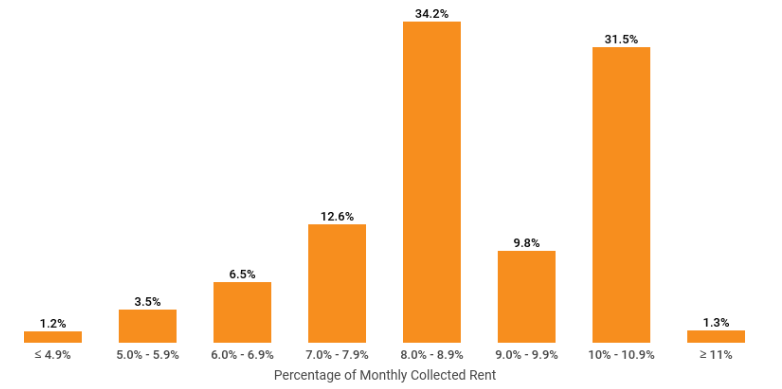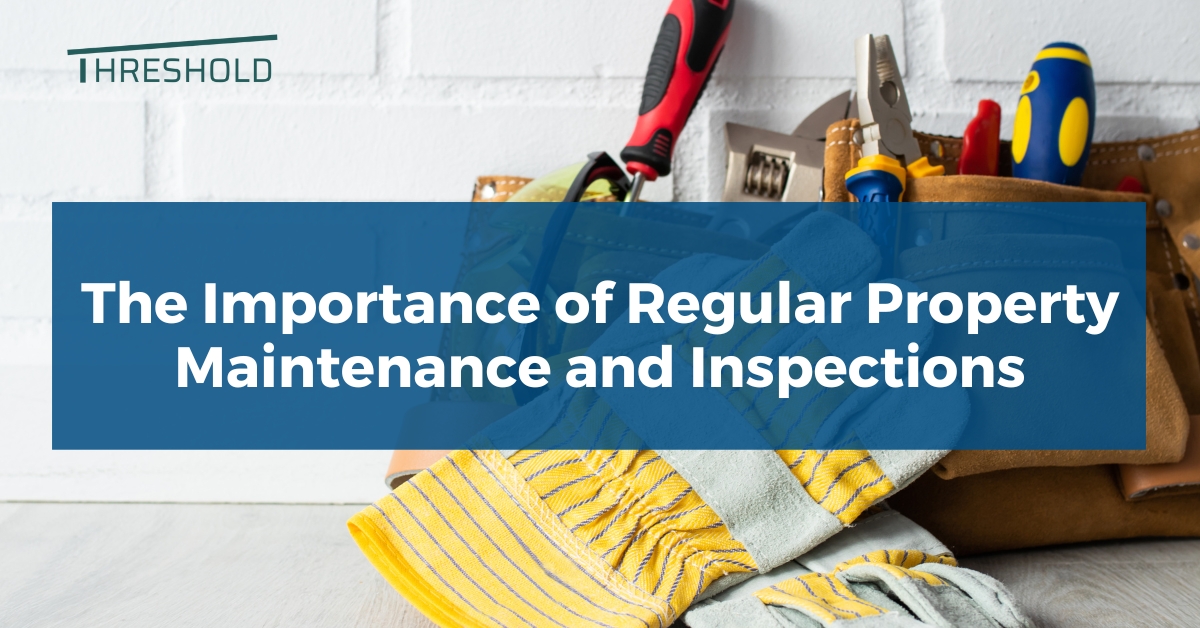Before you hire someone to oversee your apartment’s operations, you need to understand the average property management fee you’ll be charged to make sure it aligns with your budget. Our guide will help you understand the pricing criteria of property managers, factors that influence property management fees, additional costs, and other related FAQs.

Table of contents
- Introduction to Property Management Fees in Florida
- Factors Influencing Property Management Fees
- When should you hire a property management company?
- What is the difference between Rent Due and Rent Collected?
- Average Property Management Fees: Florida’s Typical Fee Structures
- Additional Fees associated with Property Management
- Comparing Property Management Companies in Florida
- How to choose the right property management company
- What’s the Best Property Management Company in Miami, Florida?
Introduction to Property Management Fees in Florida
Do you know how much you are spending to manage your rental property? There are two major ways that professional property management businesses in Florida charge their landlords: a flat fee or a percentage of rent.
- Percentage of Rent: Under this arrangement, property managers withhold a portion of the monthly rent, typically 8% to 12%. However, bear in mind that this percentage may change depending on several variables. Additionally, if you own a large quantity of devices, this fee may even be discounted for you.
- Flat Fee: As an alternative, some businesses choose to tie their monthly charge to a fixed percentage of the rent. In the flat fee structure, the size of your property determines your monthly payment amount more than the amount of rental income it brings in.
ALSO READ: 24/7 Expert Property Maintenance Services for Miami Landlords
The prices associated with property management fees in Florida are determined by several important criteria. Let’s dissect them:
Factors Influencing Property Management Fees
- Location of Your Rental Property: A major factor influencing management fees is the rental property’s geographic location. Due to increased competition and demand for management services, urban hubs and high-demand locations may charge higher costs.
- Condition of Your Rental Property: Property management fees are directly impacted by the condition of your property. Larger maintenance or repair costs may be incurred by properties to pay for these extra services.
- Market Demand: Variations in the demand for rentals can have an impact on how competitive property management costs get. When there is higher demand, the property management fee charged by companies usually goes up.
- Type of Rental Property: Property management costs may also vary depending on the kind of property you own. Every kind of property has different maintenance needs, which could have an impact on fee schedules. For instance, commercial, single-family, and apartment buildings each incur different management costs.
- Size of the Property: Maintenance, tenant vetting, and lease administration are just a few of the more involved management duties that come with larger properties. Larger properties typically have higher management fees to cover these increased maintenance costs.

When should you hire a property management company?
For Florida landlords and property owners, choosing when to hire a property management company is an important decision. The following lists the instances in which you might find it advantageous to work with a property management company:
- Limited Time or Availability: Taking care of your rental property on your own can be difficult if you live far away from it or have a hectic schedule. If you are unable to be physically present, hiring a property management business can enable you to assign duties and guarantee that your home is well-maintained.
- Growing Portfolio: Taking on more properties to manage might get stressful as your real estate investment portfolio grows. You can concentrate on expanding your portfolio by delegating the day-to-day management of your properties to a property management firm.
- Property Maintenance: Property management firms make sure that your property is well-maintained and complies with local laws, from routine maintenance duties to emergency repairs. By sparing a budget for property management fees and being proactive, you can protect your investment’s value and save expensive harm.
- Legal Compliance: For new landlords in particular, navigating the laws and regulations about tenants can be challenging. Property management firms lower your chance of legal issues or fines by keeping abreast of the most recent real estate regulations and making sure your rental property stays compliant.
What is the difference between Rent Due and Rent Collected?
Rent Due:
According to their lease agreement, this is the entire amount of rent a tenant owes for a given time frame, generally a month. It is the sum that, according to the terms of the lease, must be paid by the renter on a specific day each month.
Rent Collected:
Rent collected refers to the amount that the landlord or property management business receives from tenants. Tenant compliance is enforced by property managers, who regularly monitor tenant payments. Managers maintain smooth operations and quickly resolve any problems by keeping an eye on the finances and regular rent payments.
Average Property Management Fees: Florida’s Typical Fee Structures
Now let us examine the typical fee structure of property management costs in Florida. Consider it akin to getting a behind-the-scenes look at how they calculate figures. We can answer your questions regarding fixed-rate fees or percentage-based fees. Well, let’s dissect it!
- Percentage-Based Fees: Each month, you pay a portion of the rent, often between 8% and 12%. For example, if the monthly rent is $1,000 and the fee is 10%, your payment would be $100. It is clear-cut and simple to comprehend.
- Fixed-Rate Charges: With predetermined-rate charges, your monthly payment is fixed and unaffected by your rent revenue. It provides you with monthly expense predictability, much like a set bill.
- Hybrid Fee schedules: These plans combine fixed-rate and percentage-based fees to provide flexibility. You can use a combination of both to customize your payment schedule to meet your needs. It all comes down to figuring out what suits you the best.

Additional Fees associated with Property Management
- Startup Fees: Consider this to be the entry fee to your property management club. It’s similar to organizing your rental house for efficient use, including setting up an online portal, notifying tenants, and doing first inspections. Typically, a single payment of $500 or less.
- Maintenance fee: Although maintenance is normally covered by your monthly management fee, your property manager may take money out of a reserve fund to make significant repairs. It functions similarly to a house rainy-day fund. At least one month’s rent should be saved.
- Tenant Placement fee: This amount pays for the search for the perfect tenant. comprises setting up the lease, advertising, and screening. about equates to one month’s rent.
- Vacancy Fee: Even when your property is vacant, it still needs maintenance. Some businesses impose a vacancy fee instead of the standard monthly payment to cover these costs while the system is unavailable.
- Lease Renewal Fee: All paperwork and discussions for a lease renewal are handled by your property management. This cost is incurred when a lease is renewed.
- Eviction Fee: Although handling evictions is unpleasant, there will be a cost. It includes all of the work and hassle that go into the procedure.
- Early Termination Fee: There can be a fee if you decide to terminate your contract early. Recognize what to expect to prevent unpleasant surprises in the future. The amount you pay is determined by the conditions and nature of your contract.
Negotiating Property Management Fees: Tips For Negotiating Lower Fees
- Do Your Homework: Find out how much other local property management firms are charging. When the time comes to negotiate, you will have some ammunition and an upper hand to help you settle on an affordable rate.
- Flexibility is key: The secret is to be flexible and not be afraid to bargain! To gain your business, property management companies may be prepared to reduce their costs or provide additional services.
- Long-Term Relationships: Ask if a property management firm offers savings for long-term contracts if you want to stay with them for a long time. Over time, it can save you a significant amount of money when paying the property management fee.
Understanding Contract Terms and Conditions:
Let’s now discuss comprehending the specifics of your contract:
- Read the fine print. Please make sure you understand exactly what you’re committing to before signing on the dotted line. Be mindful of items like termination terms, additional costs, and cancellation procedures.
- Ask questions: Never be afraid to ask for clarification if something in the contract doesn’t make sense. Clearing up any confusion now can save you from being taken aback later.
Seeking Value-Added Services:
Finally, let’s talk about looking for those extra benefits that do make a difference:
- Look Beyond the Basics: All property management firms provide the necessities, such as upkeep and rent collection, but what about the extras? Seek out businesses that provide value-added services like tenant and owner web portals, routine property inspections, or even marketing support.
- Inquire About Discounts: If you sign up for additional services, some property management companies may give you discounts or maintenance packages. It never hurts to ask! By staying informed, you can capitalize on offers and discounts to pay less property management fees for your investment.
Comparing Property Management Companies in Florida
- Research and Screening: Look for local property management companies online to start your search. Review their offerings and services to find out what other people have to say. It is analogous to selecting a restaurant after perusing the menu.
- Requesting Quotes and Proposals: After you’ve selected a few possibilities, ask for an estimate. You should find out the price, just like when you get an estimate for home repairs. It is best to inquire about additional costs to avoid unpleasant surprises.
- Evaluating Services and Fees: The exciting part is about to begin: contrasting the offerings of each business. Make sure their rates are transparent and that their services meet your demands. You want a business that is open to you and doesn’t take any unexpected turns. By comprehending the average property management fee charged by a company, landlords can define a cost-effective budget and a strategy to maximize their returns on investment.
RELATED POST: Tips to Help You Choose the Best Multifamily Property Manager
How to choose the right property management company
- Check Their Credentials: Verify the insurance and license status of the business. Working with experts who are qualified to support their expertise is what you want to do.
- Evaluate Their Services: Examine the services they provide in detail. Do they take care of all the things you require, such as collecting rent, maintaining tenants, and screening tenants?
- Consider Their Communication: In property management, communication is essential. Make sure you can easily contact the company with any questions or concerns you may have.
- Get transparent about fees: No one enjoys being taken by surprise, particularly when it comes to costs. Ensure that the business is transparent about its prices and any other expenses you may be responsible for.
- Trust your guts: In the end, follow your intuition. Continue looking until you locate a company that meets all of your requirements if anything doesn’t feel right or you’re not at ease there.
What’s the Best Property Management Company in Miami, Florida?
After doing all that comparison and research, you’re undoubtedly asking yourself, “Who’s the best property management company in Miami, Florida?”. Looking at Expertise’s list of the top 17 property management companies in Miami and the Southern Florida region, we strongly recommend working with Threshold Property Management Agency. They’re a great option for landlords seeking peace of mind and the highest possible returns on their investment properties because of their extensive services, upfront pricing, and an excellent reputation.
FREQUENTLY ASKED QUESTIONS
In Florida, property management companies charge between 8% and 12% of the rent.
Yes, there are other expenses in addition to the property management charge. These include starting, maintenance, tenant placement, vacancy, lease renewal, eviction, and early termination fees.
To negotiate property management rates, it is necessary to comprehend the conditions of the contract, look for value-added services, and compare bids from several providers.
Factors influencing property management fees include the location and state of the rental property, demand in the market, the kind and size of the property, and services included in the management package.
To compare Florida property management businesses, do your homework, interview potential employers, get quotations and proposals, assess the services provided, demand transparency, and take reviews and referrals into account.






